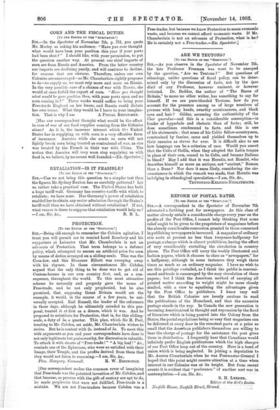ARE WE TEUTONS P
(To THE EDITOR OP THE "SPECTATOR.") • • SIR,—As you observe in the Spectator of November 7th, the late Professor Freeman was wont to be annoyed by the question, "Are we Teutons ? " But questions of ethnology, unlike questions of fiscal policy, can be deter- mined only by the discussion of facts, not by the ipxe dixit of any Professor, however eminent, or however irritated. Dr. Beddoe, the author of " The Races of Britain," to name no other writer, has something to say for himself. If we are pure-blooded Teutons, how do you account for the presence among us of large numbers of persons with long heads, swarthy countenances, and black eyes and hair ? Glides, assuming the authenticity of the Tiber querulus—and this is a considerable assumption—is fonder of hyperbole and rhetoric than of facts ; still, he does sometimes condescend to facts, and this is one of his statements : that some of his Celtic fellow-countrymen, constrained by famine, came and yielded themselves up to their enemies as slaves for ever. It is difficult also to see how language can be a criterion of race. Would you assert that the Celts of Gallia, when they adopted the Latin tongue in place of their own, ceased to be Celts, and became Italians in blood ? May I add that it was Horatio, not Hamlet, who describes himself as more an antique, not "ancient," Roman than a Dane P Nor does it seem likely, considering the cir- cumstances in which the remark was made, that Horatio was indulging in ethnological speculation.—I am, Sir, &c.,
TEDTONICO-KELTICO-NEOLITHICUR.














































 Previous page
Previous page